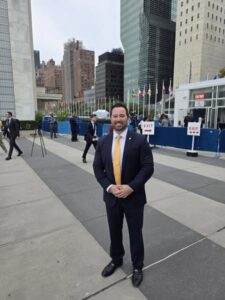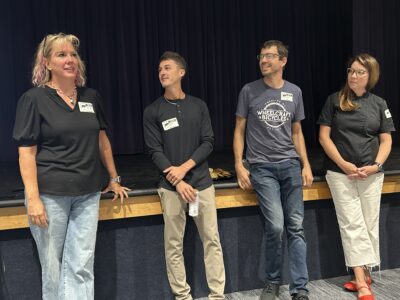Fluharty Testifies During ‘Brain Economy’ Discussion at United Nations

Delegate Shawn Fluharty, D-Ohio, stands outside the United Nations building in New York before presenting there during a discussion of gambling addiction and “the brain economy.” (Photo Provided)
WHEELING — The United Nations last week needed someone to testify last week about the effects of gambling addiction on society, and what was being done to curb its effects.
Delegate Shawn Fluharty, D-Ohio, got the call to come speak at the U.N. headquarters in New York and address those representing many of the world’s countries.
“There are moments in life where you are just kind of awestruck standing there with all these people, and so many nations represented,” Fluharty said. “I can’t really say it was a bucket list moment, because I didn’t think it was imaginable.”
Fluharty’s journey to the U.N. actually began a year ago when he passed “The Responsible Gaming and Research Act” in the West Virginia Legislature. The legislation sets forth a framework for requiring gaming data collection for research on the topic and examining gambling’s impact on the community.
It gives West Virginia University access to all data from sports betting and i-gaming, and they have set up a program there to better understand problem gambling and find solutions to address the problem, he explained.
Fluharty also serves as president of the National Council Of Legislators From Gaming States.
All of this led him to work with the European Brain Council, an organization whose mission is “to promote brain research with the ultimate goal of improving the lives of the millions of Europeans living with brain conditions.” It also has a goal to foster cooperation between its member organizations and “promote dialogue between scientists, industry and society.”
Fluharty is chair of the council’s Better Gambling Forum committee, which is looking to establish global policies to protect players and the public worldwide.
Through his association with the council, Fluharty attended the G7 Conference in Alberta, Canada in June to discuss his legislation and gaming addiction data. This got him invited to the United Nations to discuss the issue.
“They are essentially trying to have a global policy initiative that works with what they call the ‘Brain Economy,'” Fluharty explained. “That goes from the health aspect – such as treating non-communicable diseases – but also includes things like gambling addictions.
“So that work at West Virginia University falls within that overall global economy approach of the ‘Brain Economy,’ where data is treated as a currency – almost.”
Those at the UN discussed if there were breakthroughs somewhere in the work in treating a brain disease, what would be the next step in sharing that information globally, he continued.
“If something is happening in rural West Virginia, how is that treated here versus how it is treated in New York or somewhere else in the world?” Fluharty asked. “So this global initiative on the ‘Brain Economy’ and the European Brain Council – that is how this all came about.”
Fluharty spent two days at the United Nations, and was accompanied by Dr. Harris Eyre – a physician and neurosurgeon who is heading up gambling addiction research efforts at WVU.
On the first day, Fluharty led a symposium organized by the Better Gaming Forum.
On the second day, he had the opportunity to testify in the main room at the U.N.
“That was the part that was absolutely amazing – to be inside the United Nations,” Fluharty said. “The security was immeasurable. There were streets blocked well before getting to the UN.
“It felt like I went through 10 airports to get through the security for the U.N..”
Fluharty reports when he was recognized prior to his testimony, he was introduced as “Delegate Shawn Fluharty of West Virginia.”
He isn’t certain any legislator from West Virginia had ever before been asked to testify at the U.N.
“And we’re not done. I think we’re going to take this to the G20,” Fluharty said. “I think if we could put together global policy within this ‘Brain Economy’ framework, it would have ramifications for generations to come.”
The work that Eyre and others are doing is getting the attention of policymakers throughout the world, and Fluharty said he is just honored to be among those involved.
“To say this is something that started in the West Virginia Legislature, got recognized nationally and is now getting recognized globally, is really something we can all be proud of,” he continued.
Fluharty recounts that after he stepped out of the United Nations building, it truly struck him what he had done, where he was and from where he had come.
“I was a kid from a trailer park in West Virginia, and I just walked out of an incredible meeting with people from throughout the world. It was a full-circle moment.” he said.
The next day he returned to West Virginia and spoke to students at the WVU School of Law about his experience, and how the state was becoming a player in the “Brain Economy.”
He is a graduate of the law school.
“I told them I don’t want to hear anything about how West Virginia can’t compete, or because you’re from West Virginia or go to school in West Virginia that you can’t be part of the world conversation. I just left the United Nations yesterday,” Fluharty said.





